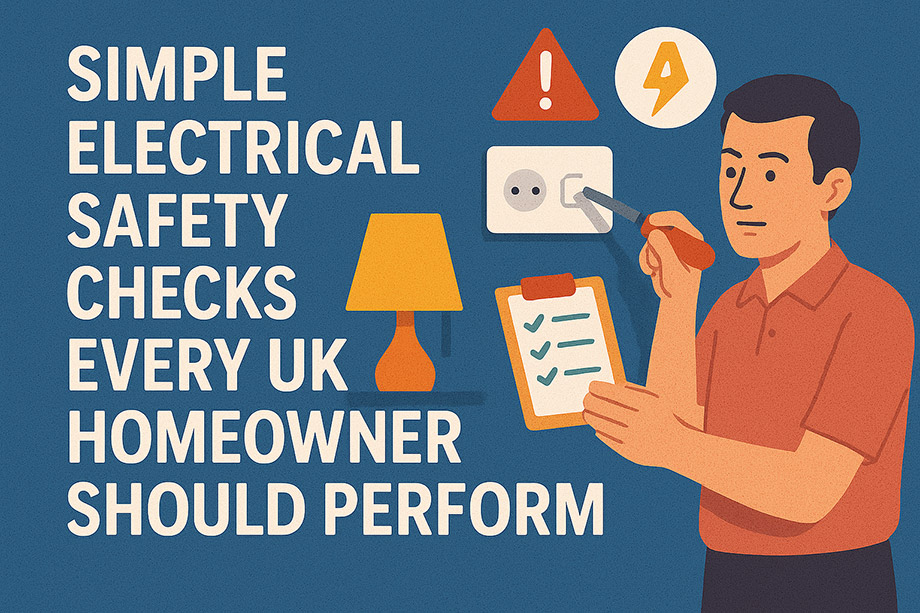Simple Electrical Safety Checks Every UK Homeowner Should Perform

Electrical safety in the home is often overlooked, but it plays a vital role in protecting you, your family, and your property. Faulty wiring or damaged appliances can lead to shocks, fires, and costly repairs. Fortunately, many electrical safety checks can be done easily by homeowners themselves without the need for specialist tools or training. By taking simple precautions and regularly inspecting your home’s electrical systems, you can reduce risks and keep your household safe.
This guide explains straightforward electrical safety checks every UK homeowner should perform. It will help you spot potential hazards early and understand when to call in a professional electrician for further inspection or repair.
Table of Contents
Why Electrical Safety Checks Are Essential for UK Homeowners
Electrical accidents cause hundreds of injuries and property damage incidents in the UK each year. Many of these incidents could be prevented by simple safety routines. As homes age or when DIY projects are undertaken, electrical faults can develop unnoticed. Regular checks ensure your wiring, sockets, and appliances remain safe and comply with UK safety standards.
Even if your home is relatively new or has had a recent inspection, ongoing maintenance is crucial. Electrical systems can deteriorate due to wear, pests, moisture, or accidental damage. By carrying out simple checks, you’ll help avoid fires, electrical shocks, and unexpected power cuts.
Simple Electrical Safety Checks Every UK Homeowner Can Do
Here are practical steps you can take to check electrical safety around your home:
1. Check the Condition of Electrical Cables and Wiring
Look for signs of wear or damage to cables and wiring visible around your home. Damaged insulation, fraying, or exposed wires pose serious risks of electric shock or fire. If you spot any damage, do not attempt to fix it yourself — contact a qualified electrician immediately.
2. Inspect Sockets and Switches
Check all your power sockets and light switches for any cracks, scorch marks, or loose fittings. If a socket feels warm to touch or sparks when plugging in devices, it may be faulty. Avoid using any socket or switch that shows these signs until it has been examined professionally.
3. Test Your RCD (Residual Current Device)
An RCD is a safety device designed to quickly cut off power if it detects an electrical fault, protecting you from shocks. Most modern UK homes have RCDs integrated into their consumer unit (fuse box). Press the test button on your RCD every three months to ensure it trips correctly. If it does not trip, call an electrician for an inspection.
4. Check Your Consumer Unit (Fuse Box)
Make sure your fuse box is easily accessible and free from dust or debris. Look for any signs of damage or overheating such as burn marks. Confirm that all switches and breakers are clearly labelled for their circuits. If you have an older fuse box, consider upgrading to a modern consumer unit with built-in RCD protection.
5. Inspect Electrical Appliances
Examine the cables, plugs, and bodies of your household electrical appliances for damage or wear. Replace any appliance with frayed cords or loose plugs. Never use appliances with damaged cords as this is a common cause of electrical fires.
6. Avoid Overloading Sockets and Extension Leads
Avoid plugging too many appliances into one socket or daisy-chaining extension leads. Overloading circuits can cause overheating and fires. Use only one extension lead per socket and choose ones with built-in overload protection.
7. Keep Electrical Equipment Away from Water
Never place electrical items near water sources such as sinks, baths, or wet surfaces. Water and electricity are a dangerous combination. If an appliance falls into water, unplug it immediately without touching the water.
8. Test Smoke and Carbon Monoxide Detectors Regularly
Though not strictly electrical wiring, smoke and carbon monoxide alarms rely on electricity to function. Test alarms monthly and replace batteries yearly. Having functioning alarms is a vital part of electrical safety and fire prevention in any home.
9. Schedule a Professional Electrical Inspection Every 5 to 10 Years
Even if your simple checks find no problems, it is recommended to have a full electrical safety inspection by a registered electrician every 5 to 10 years, or when you buy a new home. This inspection will check wiring, circuits, and compliance with current regulations to ensure your home is safe.
Pros and Cons of Doing Your Own Electrical Safety Checks
Pros
- Cost-effective: Performing basic checks yourself saves money on unnecessary call-outs.
- Early problem detection: Spotting faults early can prevent costly repairs or dangerous situations.
- Peace of mind: Regular inspections help you feel confident that your home is safe.
- Empowerment: You gain better understanding and control over your home’s electrical safety.
Cons
- Limited expertise: You may miss hidden or complex issues that require professional knowledge.
- Safety risks: Attempting repairs or intrusive tests without proper training can be dangerous.
- False security: Passing simple checks does not guarantee full safety compliance or absence of faults.
- Legal compliance: Only certified electricians can issue official electrical safety certificates when needed.
Final Thoughts
Electrical safety is a vital aspect of home maintenance that every UK homeowner should take seriously. While some checks can be done simply and safely by you, others require the expertise of a qualified electrician. Performing regular inspections of your cables, sockets, appliances, and safety devices will help you catch issues early and maintain a secure home environment.
Never ignore warning signs such as flickering lights, sparks, burning smells, or frequent breaker trips. When in doubt, always seek professional advice to avoid hazards and comply with UK electrical safety standards.
By adopting these simple electrical safety checks, you protect your family, prevent costly damage, and ensure your home remains a safe haven for years to come.
Last Updated on July 29, 2025 by James Cartwright







